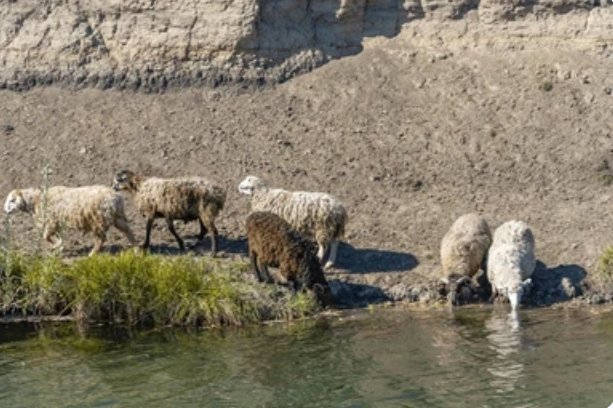
Functions of water in farm animals
1• Water act as transportation of food nutrients. Water is universal solvent molecules that dissolve many substances. The complex food substances that are eaten by the animals are mostly solids. Consider hay, silage and other cereals that are taken by farm animals, they are very hard. The nutrients in them can only be dissolved when the mix with the blood through the villi of the ileum only when the nutrients are solvent. It water that does this work.
2• Water acts as Hydrolysis. The food components are solid as I mentioned earlier, hence they need to be disintegrated into smaller units for easy absorption.
3• Homeostasis. Water helps in the maintenance of of body temperature, osmotic pressure, PH and turgidity of the cell.
4• Lubrication. Waters supports in lubrication of muscles and various joints for easy movements, example is synovial fluids.
5• Excretion. Removal of foreign and unwanted metabolic materials from the body is done with the help of water. For example urea, faeces and excess salts.
6• Prevention of constipation. Water is very essential substance for the farm animals to free their bowels.
Sources of water
1• Voluntary water intake by farm animals: From hand watering, ponds, rivers, streams, dams, wells and many other places that the anima l gets water. We normally observe is that most animal on pasture grazing have advantage of getting water around, but those that are confined in their pens, kraal of hutches, the farm has to carry water for the farm animals.
2• Water from feed eaten. For instance, succulent feeds like green grass contain about 80% water, dry grains 20% water.
3• Metabolic water. This is obtained from oxidation of hydrogen containing organic compounds - C6H12O6 -> energy + 6CO2 + H2O
Water requirements of animals
Water requirements of animals depends on the animals age as mentioned and particular physiological needs. Whether the animals are in the state of of maintenance, growing, fatting, pregnant or breastfeeding.
1• For example animals breastfeeding its young ones will need more water to replace the one that's lost through milk secretion.
2• The weather condition of the time . That's the animal will require more water in the hot environment to replace those lost through respiration.
3• A dry food eaten by an animal may activate the animal to require more water than eaten succulent food.
4• A high protein or salt in diet leads to excretion of water hence more water is needed for replacement of water lost.
Factors influencing water requirements
1. Temperature. Water requirements rise when animals are subjected to heat stress as they loss large quantities of water via evaporation from the skin and lungs.
2. The presence of certain food additives raises the water requirements of animals.
*3. Some diseases like coccidiosis may decrease water requirements.
Symptoms associated with water deficiency
1• Dehydration of the body leading to loss of body weight.
2• Panting
3• Dry faeces ( Constipation)
4• Decrease in quantity of urine
5• Decrease in milk, egg and meat production
6• Inflammation of the kidney
Health Advice
As animal scientist I would therefore advise that regular water is needed by farm animals to keep animals health status improved. Hence, morning, afternoon and evening water is needed by farm animals.
Water to be given to farm animals isn't any ordinary water but clean and safe devoid of any impurities is required.





